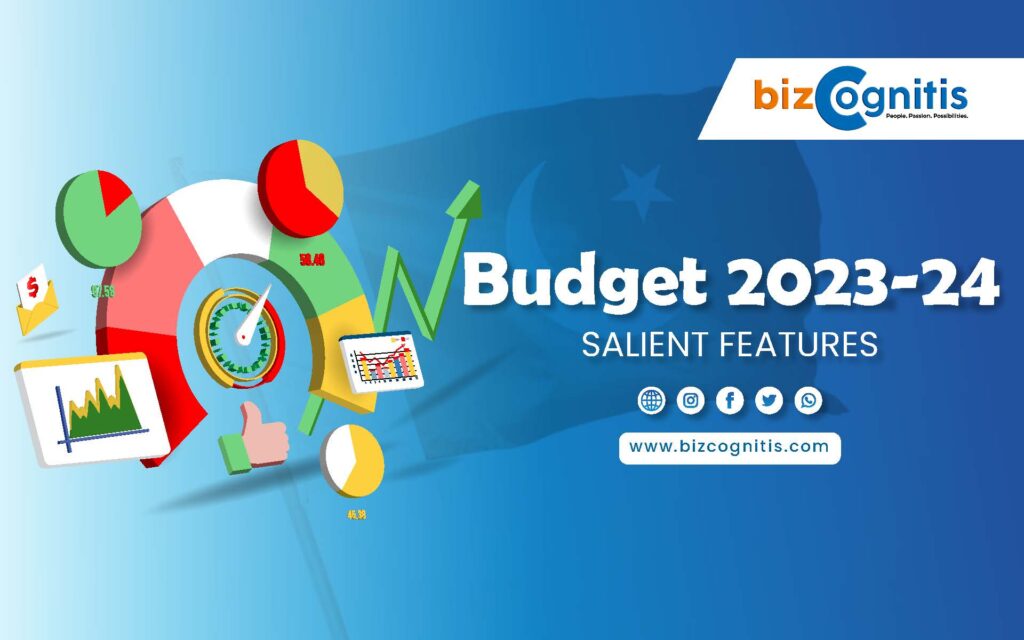Noteworthy Points From Pakistan’s Annual Federal Budget for the Year 2023-2024
The eagerly awaited Pakistan’s Annual Federal Budget 2023-2024 was officially declared on June 9, 2023. This comprehensive budget carries immense significance for individuals, businesses, and the overall economy of the country.
In this blog post, we will delve into the noteworthy highlights of the budget, with a specific focus on the pivotal income tax and sales tax changes. These modifications hold a crucial role in shaping the financial landscape. Stay informed and discover how these budget adjustments can impact your financial decisions and overall economic outlook.
Income Tax Reforms: Key Highlights from Pakistan’s Annual Federal Budget 2023-2024
Pakistan’s Annual Federal Budget 2023-2024, announced on June 9, 2023, brings significant reforms to the income tax system. These reforms aim to promote economic growth and improve the overall tax structure. In this blog post, we will explore the key highlights of the income tax changes introduced in the budget.
Higher Tax Slabs for High-Income Earners: The budget introduces new tax slabs for individuals earning above Rs. 300 million, Rs. 400 million, Rs. 500 million, and exceeding Rs. 500 million. The corresponding tax rates for these slabs are 4%, 6%, 8%, and 10% respectively. This change enhances the progressive nature of the tax system, ensuring a fair distribution of tax burden.
Cash Withdrawal Tax: To encourage tax filing and formal economy participation, non-filers are subject to a 0.6% tax on cash withdrawals exceeding Rs. 50,000 per day. This measure aims to promote tax compliance and discourage cash transactions.
Tax on Bonus Shares: Filers are subject to a 10% tax on bonus shares, while non-filers face a higher rate of 20%. This initiative generates additional revenue from capital gains arising from bonus share issuances, incentivizing tax filing.
Withholding Tax on International Transactions: The budget raises the withholding tax on international transactions made through debit/credit cards. For filers, the rate increases from 1% to 5%, and for non-filers, it rises from 2% to 10%. This measure aims to enhance revenue collection from cross-border transactions and promote transparency.
SME Expansion: The budget significantly raises the turnover limit for Small and Medium Enterprises (SMEs) in the manufacturing sector, from Rs. 250 million to Rs. 800 million. Furthermore, the budget includes the IT and IT-enabled services sector within the SME category, fostering growth and innovation.
Tax Credits for Property Construction: Individuals and builders engaged in property construction during the tax years 2024-2026 will benefit from tax credits. Individuals constructing their own house can claim a credit capped at the lower of 10% of tax liability or Rs. 1 million. Builders, on the other hand, can avail a credit of 10% of tax liability or up to Rs. 5 million for new construction projects.
Exemption for Non-Resident Pakistanis: Non-resident Pakistanis purchasing immovable properties through Foreign Currency Value Accounts (FCVA) or NRP Rupee Value Accounts (NRVA) will be exempt from advance tax. This exemption aims to encourage investment from overseas Pakistanis and boost the real estate sector.
Increased Limit for Foreign Remittances: The budget raises the limit for foreign remittances from Rs. 5 million to USD 100,000 per year. Remittances within this limit will not undergo inquiries regarding their nature and source, simplifying the process for overseas Pakistanis and promoting a favorable remittance environment.
Tax Relief for IT Exporters: IT and IT-enabled services exporters are now exempt from filing sales tax returns to avail the reduced tax rate under the final tax regime. This change simplifies the tax compliance process for IT exporters, fostering growth and promoting Pakistan’s IT sector.
Sales Tax Adjustments: Key Highlights from Pakistan’s Annual Federal Budget 2023-2024
Pakistan’s Annual Federal Budget 2023-2024 brings significant adjustments to the sales tax system, aiming to streamline taxation processes and promote economic growth. In this blog post, we will explore the key highlights of the sales tax changes introduced in the budget.
Electricity Exclusion: Simplifying Taxation for the Energy Sector: The budget declares that the production, transmission, and distribution of electricity are no longer considered “Goods” or “Supply” for federal tax purposes. This change streamlines the taxation process for the energy sector, reducing complexities and promoting efficiency.
Criteria Removal: Benefit for Retailers in Pakistan: The budget removes the criteria that determined the status of “Tier-1 Retailers” who were required to integrate their Point of Sale systems with the Federal Board of Revenue (FBR). This change benefits retailers with shop areas of 1000 sq. feet or 200 sq. feet (for furniture shops) and those engaged in jewelry trade. By eliminating these criteria, the budget simplifies compliance requirements for retailers, encouraging business growth.
Sales Tax Increase: Impact on Textile and Leather Retailers: Tier-1 Retailers dealing in leather and textile products will now face an increased sales tax rate of 15% instead of the previous 12%. This measure aims to enhance revenue collection from these sectors and contribute to the overall economic growth.
Tax Incentive: IT-related Imports for Software Exporters: Software exporters registered with the Pakistan Software Export Board can now import IT-related products without paying sales tax. This incentive supports the growth of the IT sector and encourages software exports, promoting technological advancement and economic prosperity.
Affordable Healthcare: Reduced Sales Tax on Medicine: The sales tax rate on substances registered as drugs and medicine has been significantly reduced from 18% to 1%. This change aims to make healthcare more affordable and accessible to the public, ensuring better health outcomes for the population.
Sales Tax Exemption Change: Impact on Bulk Edible Product Sales: The budget proposes to withdraw the exemption of sales tax on the bulk sale of branded edible products, including milk, yogurt, and red chilies. This measure aims to generate additional revenue from the sale of these products, contributing to the overall tax collection.
The sales tax adjustments introduced in Pakistan’s annual federal budget 2023-2024 aim to streamline taxation processes, promote economic growth, and incentivize various sectors. By aligning with these changes, businesses can adapt to the new tax landscape and capitalize on the proposed benefits. As a trusted partner in tax compliance, Bizcognitis provides individuals with an innovative online platform, The Bizcognitis website, simplifying the tax filing experience and enabling seamless fulfillment of tax obligations.

